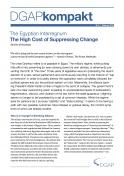The military intervention of July 3, 2013 that toppled the year-long rule of the Muslim Brotherhood marked a new chapter in the history of Egypt’s state. Thirty months of contestation and negotiation had followed the January 2011 uprising, and many Egyptians once again took to the streets, this time to call for the ouster of Islamist President Mohamed Morsi. Protestors were supported by key state institutions. Far from homogenous, the alliance that toppled the MB included the business cronies of former President Hosni Mubarak, their allies in the police and in the state bureaucracy, and their old rivals within other state institutions (primarily within the judiciary and the military). Notably, however, the anti-Morsi forces also included liberal politicians and pro-democracy revolutionaries who had been active in the 2011 uprising.
Within a few weeks, the discourse of a “war on potential terrorism” had brought about a shift in the alliance’s common denominator. Now, instead of pursuing the broad but ambiguous goal of “restoring the revolution” of 2011, a clearer slogan emerged: “restoring the state." This necessarily excluded the more radical pro-democracy camp, which had played such an important role in the 2011 upheaval but remained persistently spontaneous and not institutionalized. The “war on terrorism” meant that the “democratic” camp within the new regime – namely the camp led by the liberal Mohammed ElBaradei (which briefly comprised a handful of ministers and members of the constitutional amendments committee) – was increasingly sidelined. As polarization mounted and “war on terrorism” rhetoric intensified, the liberals received a major blow on August 14, 2013, when government forces stormed two pro-Morsi sit-ins at Rabaa and Nahda squares in Cairo. The massacre resulted in the deaths of at least 600 MB supporters, and prompted ElBaradei to resign in protest from his vice presidency, a position he had held for a mere four weeks. The remnants of the liberal camp were further alienated by a raft of restrictive legal measures, including the protest law of November 2013, which enabled a massive wave of arrests and widespread suppression of protests. In the aftermath of the January 2014 constitutional referendum, the presence and influence of the pro-democracy movement became almost invisible.
Thus, in just a few months, the military-led government had managed to banish most of its rivals from the political scene. Islamists, revolutionaries, and liberals (shorthand for a range of varied and fragmented positions within the political spectrum) were effectively crippled after almost three years as actors within the interim Egyptian polity – albeit in unequal weights.

